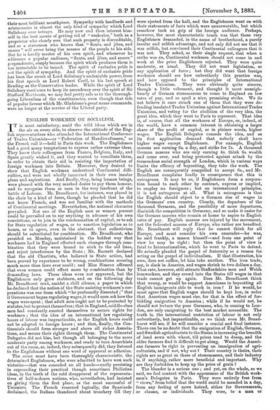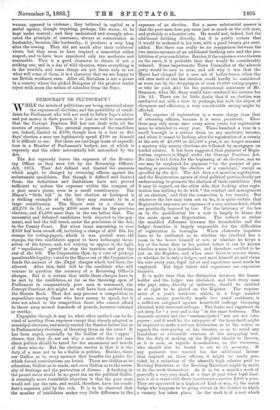ENGLISH WORKMEN ON SOCIALISM.
IT is most satisfactory, amid the wild ideas which are in the air on every side, to observe the attitude of the Eng- lish representatives who attended the International Conference of Trades Unionists—or "Federation of Handicraftsmen," as the French call it—held in Paris this week. The Englishmen had a good many temptations to express rather extreme ideas. They knew their colleagues from France, Belgium, Italy, and Spain greatly wished it, and they wanted to conciliate them, in order to obtain their aid in resisting the importation of foreign workmen into Britain. Moreover, they desired to show that English workmen understood Continental diffi- culties, and were not wholly immersed in their own insular plans and aspirations. And finally, they, being human beings, were pleased with the very marked desire to pay them honour, and to recognise them as men in the very forefront of the battle of Labour. Mr. Broadhurst, for instance, was placed in the chair by a kind of force, though he pleaded that he did not know French, and was not familiar with the methods of Continental meetings. Nevertheless, the national character prevailed. Not one of the English men or women present could be prevailed on to say anything in advance of his own convictions, or to join in the condemnation of capital, or to ask for State regulation of wages, or to sanction legislation as to hours, or to agree, even in the abstract, that collectivism should be substituted for combination. Mr. Broadhurst, who presided on Monday, maintained in the boldest way that workmen had in England effected such changes through com- bination that they were bound to stick to the old lines, and reject interference by the State ; Mr. Burnett declared that the old Chartists, who believed in State action, had been proved by experience to be wrong, combinations securing much more than laws ever could ; and Miss Simcox affirmed that even women could effect more by combination than by demanding laws. These ideas were not approved, but the Englishmen only grew stubborn, and on the following day Mr. Broadhurst read, amidst a chill silence, a paper in which he declared that the notion of the State assisting workmen's cor- porations was one from which "he profoundly dissented ;" that if Government began regulating wages, it would soon ask how the wages were spent ; that adult men ought not to be protected by statutes, but to protect themselves; that in England, middle-class men had constantly exerted themselves to secure rights for workmen ; that the idea of an international law regulating hours of labour was impracticable, as the English hours could not be adapted to foreign hours ; and that, finally, the Con- tinentals should form stronger and above all richer Associa- tions, and secure their rights through them. The Continental Delegates did not hiss, but though all belonging to the more moderate party among workmen, and ready to turn Anarchists
out of the room, as, indeed, they subsequently did, they listened to the Englishman without one word of approval or adhesion. The scene must have been thoroughly characteristic, the determined Englishmen, who were admitted to have won such victories—that was conceded on all bands—coolly persisting in expounding their practical though sometimes Philistine ideas, in the teeth of the cold disapproval of the representa- tives of half-a-dozen nations, who, nevertheless, had insisted on giving them the first place, as the most successful of Unionists. The French reasoned logically, the Spaniards declaimed, the Italians thundered about treachery till they were ejected from the hall, and the Englishmen went on with their statements of facts which were unanswerable, but which somehow took no grip of the foreign audience. Perhaps, however, the most characteristic touch was that these very Englishmen demanded, in the name of brotherhood, a purely insular and selfish advantage, and not only did not see that it was selfish, but convinced their Continental colleagues that it was not. They asked, as their single request, that when a strike was on, Continental workmen should not come in and work at the price Englishmen rejected. They were quite moderate, as usual. They did not want legislation, or any application of force ; but they did want that foreign workmen should see how unbrotherly this practice was, and how opposed to the principles of International Trades Unionism. They were obviously quite sincere, though a little vehement, and thought it most unneigh- hourly of German stonemasons to come to England on low rates of pay, and so spoil a nice, promising strike. We do not believe it once struck one of them that they were de- fending insulated Trades Unionism against International Trades Unionism, and voting for the abolition of the very idea, the great idea, which they went to Paris to represent. That idea is, of course, that all the workmen of Europe, or, indeed, of the world, have a common interest in obtaining a huger share of the profit of capital, or in plainer words, higher wages. The English Delegates concede the idea, and as its first application demand that nobody shall have higher wages except Englishmen. For example, English masons are earning 6s. a day, and strike for 7s. A thousand German masons who are only earning 4s. think 68. wealth and come over, and being protected against attack by the tremendous social strength of London, which in various ways limits the efficacy of boycotting, they take the work. The English are consequently compelled to accept 6s., and Mr. Broadhurst complains loudly in consequence that this is outrageous. It may be so, if Englishmen form a corpora- tion bound to each other by contract, express or implied, to employ no foreigners ; but on international principles, it is not outrageous at all. What is outrageous is that the English should object to a German rise of wages in the Germans' own country. Clearly, the departure of the thousand Germans, and the possibility of more departures, diminish the competition in Germany, and so make it easier for the German masons who remain at home to aspire to English rates of pay. English masons are injured by the movement, not the federated masons of Europe, who rather are benefited. _ Mr. Broadhurst will reply that he cannot think for all Europe, and must consider his own comrades—he was, he said frankly, a mason himself—and from one point of view he may be right ; but then the point of view is fatal to Internationalism, which he went to Paris to defend. He actually pleaded the gospel of fraternity as a reason for acting on the gospel of individualism. If that illustration, his own, does not suffice, let him take another. The iron trade, say, is slack in America, and wages shrink to two dollars a day. That rate, however, still attracts Staffordshire men and Welsh ironworkers, and they crowd into the States till wages in that trade cannot get up again. Does Mr. Broadhurst think that wrong, or would he support Americans in boycotting all English immigrants able to work in iron ? If he would, he must agree that English wages should be kept low, in order that American wages must rise, for that is the effect of for- bidding emigration to America ; while if he would not, he should not lecture the poor Germans, who, in coming to Lon- don, are only emigrating to the best market accessible. The truth is, the international restriction of labour is not only unbrotherly, but impracticable, as we think even Mr. Broad- hurst will see, if he will consider a crucial and final instance. There can be no doubt that the emigration of English, German, and Swedish agriculturists to the States is increasing the breadth of land sown with wheat, till prices tend to droop, and the older farmers find it difficult to get along. Would the Ameri- can farmers be right in preventing an immigration of agri- culturists, and if not, why not I Their country is theirs, their rights are as great as those of stonemasons, and their industry is, if anything, rather more beneficial and important. Why are they forbidden to keep up the price of grain ?
The blunder is a serious one ; and yet, on the whole, as we said, we feel content with the appearance of the British work- men's Delegates in Paris. They were entirely free from " views," from belief that the world could be mended in a day, from any feeling of mere hatred, either for Governments, or classes, or individuals. They were, to a man or
woman, opposed to violence ; they believed in capital as a useful agency, though requiring, perhaps, like steam, to be kept under control ; and they understood and strongly advo- cated the principle of insurance, always as conservative as husbandry, because, like husbandry, it produces a crop long after the sowing. They did not much alter their confreres' views, but they seem to have inspired a somewhat sullen respect, and to have been considered only too moderate and reasonable. That is a good character to obtain, if not a striking one, and in a day of wild theories, when everything is in the crucible, and some things are put there only to see what will come of them, it is a character that we are happy to see British workmen earn. After all, Socialism is not a power in a country where the picked Delegates of the greatest trades reject with scorn the notion of subsidies from the State.







































 Previous page
Previous page